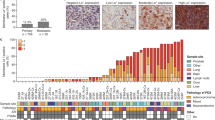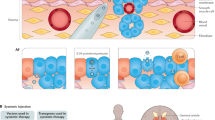Abstract
The nitroreductase (NR)/CB1954 enzyme prodrug system has given promising results in pre-clinical studies and is currently being assessed in phase I and II clinical trials in prostate cancer. Enhanced cell killing by apparent immune-mediated mechanisms has been shown in pancreatic and colorectal cancer models, by co-expressing murine granulocyte macrophage colony-stimulating factor (GM-CSF) with NR in a single replication deficient adenoviral vector. This consists of the CMV immediate early promotor driving expression of NR, with an internal ribosome entry site (IRES) and the gene for murine GM-CSF (mGM-CSF). To examine if similar enhancement of tumour cell killing could be produced in prostate cancer, the TRAMP model was chosen. Results illustrate that the combination of suicide gene therapy using NR and CB1954, with cytokine stimulation with mGM-CSF gives an improved response compared with either modality alone. The mechanism of this improved response is however likely to be non-immune based as it lacks a memory effect.
This is a preview of subscription content, access via your institution
Access options
Subscribe to this journal
Receive 4 print issues and online access
$259.00 per year
only $64.75 per issue
Buy this article
- Purchase on Springer Link
- Instant access to full article PDF
Prices may be subject to local taxes which are calculated during checkout






Similar content being viewed by others
References
Knox RJ, Friedlos F, Jarman M, Roberts JJ . A new cytotoxic, DNA interstrand crosslinking agent, 5-(aziridin-1-yl)-4-hydroxylamino-2-nitrobenzamide, is formed from 5-(aziridin-1-yl)-2,4-dinitrobenzamide (CB 1954) by a nitroreductase enzyme in Walker carcinoma cells. Biochem Pharmacol 1988; 37: 4661–4669.
Bridgewater JA, Springer CJ, Knox RJ, Minton NP, Michael NP, Collins MK et al. Expression of the bacterial nitroreductase enzyme in mammalian cells renders them selectively sensitive to killing by the prodrug CB1954. Eur J Cancer 1995; 31A: 2362–2370.
Chung-Faye G, Palmer D, Anderson D, Clark J, Downes M, Baddeley J et al. Virus-directed, enzyme prodrug therapy with nitroimidazole reductase: a phase I and pharmacokinetic study of its prodrug, CB1954. Clin Cancer Res 2001; 7: 2662–2668.
Green NK, Youngs DJ, Neoptolemos JP, Fredlos K, Knox RJ, Springer CJ et al. Sensitization of colorectal and pancreatic cancer cell lines to the prodrug 5-(aziridin-1-yl)-2,4-dinitrobenzamide (CB1954) by retroviral transduction and expression of the E. coli nitroreductase gene. Cancer Gene Ther 1997; 4: 229–238.
Djeha AH, Thomson TA, Leung H, Searle PF, Young LS, Kerr DJ et al. Combined adenovirus-mediated nitroreductase gene delivery and CB1954 treatment: a well-tolerated therapy for established solid tumors. Mol Ther 2001; 3: 233–240.
Palmer DH, Mautner V, Mirza D, Oliff S, Gerritsen W, van der Sijp JR et al. Virus-directed enzyme prodrug therapy: intratumoral administration of a replication-deficient adenovirus encoding nitroreductase to patients with resectable liver cancer. J Clin Oncol 2004; 22: 1546–1552.
Guinan PD, John T, Baumgartner G, Sundar B, Ablin RJ . Adjuvant immunotherapy (BCG) in stage D prostate cancer. Am J Clin Oncol 1982; 5: 65.
Hodge JW, Schlom J, Donohue SJ, Tomaszewski JE, Wheeler CW, Levine BS et al. A recombinant vaccinia virus expressing human prostate-specific antigen (PSA): safety and immunogenicity in a non-human primate. Int J Cancer 1995; 63: 231–237.
Tjoa B, Boynton A, Kenny G, Ragde H, Misrock SL, Murphy G . Presentation of prostate tumor antigens by dendritic cells stimulates T-cell proliferation and cytotoxicity. Prostate 1996; 28: 65–69.
James ND, Atherton PJ, Jones J, Howie AJ, Tchekmedyian S, Curnow RT . A phase II study of the bispecific antibody MDX-H210 (anti-HER2 × CD64) with GM-CSF in HER2+ advanced prostate cancer. Br J Cancer 2001; 85: 152–156.
Dreicer R, See WA, Klein EA . Phase II trial of GM-CSF in advanced prostate cancer. Invest New Drugs 2001; 19: 261–265.
Overwijk WW, Lee DS, Surman DR, Irvine KR, Touloukian CE, Chan CC et al. Vaccination with a recombinant vaccinia virus encoding a ‘self’ antigen induces autoimmune vitiligo and tumor cell destruction in mice: requirement for CD4(+) T lymphocytes. Proc Natl Acad Sci USA 1999; 96: 2982–2987.
Steinman RM . The dendritic cell system and its role in immunogenicity. Annu Rev Immunol 1991; 9: 271–296.
Dranoff G, Jaffee E, Lazenby A, Golumbek P, Levitsky H, Brose K et al. Vaccination with irradiated tumor cells engineered to secrete murine granulocyte-macrophage colony-stimulating factor stimulates potent, specific, and long-lasting anti-tumor immunity. Proc Natl Acad Sci USA 1993; 90: 3539–3543.
Shi FS, Weber S, Gan J, Rakhmilevich AL, Mahvi DM . Granulocyte-macrophage colony-stimulating factor (GM-CSF) secreted by cDNA-transfected tumor cells induces a more potent antitumor response than exogenous GM-CSF. Cancer Gene Ther 1999; 6: 81–88.
Burch PA, Croghan GA, Gastineau DA, Jones LA, Kaur JS, Kylstra JW et al. Immunotherapy (APC8015, Provenge®) targeting prostatic acid phosphatase can induce durable remission of metastatic androgen-independent prostate cancer: a phase 2 trial. The Prostate 2004; 60: 197–204.
Todryk S, Melcher AA, Hardwick N, Linardakis E, Bateman A, Colombo MP et al. Heat shock protein 70 induced during tumor cell killing induces Th1 cytokines and targets immature dendritic cell precursors to enhance antigen uptake. J Immunol 1999; 163: 1398–1408.
Gough MJ, Melcher AA, Ahmed A, Crittenden MR, Riddle DSL, Linardakis E et al. Macrophages orchestrate the immune response to tumor cell death. Cancer Res 2001; 61: 7240–7247.
Moseley P . Stress proteins and the immune response. Immunopharmacology 2000; 48: 299–302.
Gallucci S, Lolkema M, Matzinger P . Natural adjuvants: endogenous activators of dendritic cells. Nat Med 1999; 5: 1249–1255.
Gallucci S, Matzinger P . Danger signals: SOS to the immune system. Curr Opin Immunol 2001; 13: 114–119.
Vile RG, Diaz RM, Castleden S, Chong H . Targeted gene therapy for cancer: herpes simplex virus thymidine kinase gene-mediated cell killing leads to anti-tumour immunity that can be augmented by co-expression of cytokines in the tumour cells. Biochem Soc Trans 1997; 25: 717–722.
Castleden SA, Chong H, Garcia-Ribas I, Melcher AA, Hutchinson G, Roberts B et al. A family of bicistronic vectors to enhance both local and systemic antitumor effects of HSVtk or cytokine expression in a murine melanoma model. Hum Gene Ther 1997; 8: 2087–2102.
Djeha HA, Todryk SM, Pelech S, Wrighton CJ, Irvine AS, Mountain A et al. Antitumor immune responses mediated by adenoviral GDEPT using nitroreductase/CB1954 is enhanced by high-level coexpression of heat shock protein 70. Cancer Gene Ther 2005; 12: 560–571.
Lipinski KS, Pelech S, Mountain A, Irvine AS, Kraaij R, Bangma CH et al. Nitroreductase-based therapy of prostate cancer, enhanced by raising expression of heat shock protein 70, acts through increased anti-tumour immunity. Cancer Immunol Immunother 2006; 5: 347–354.
Green NK, McNeish IA, Doshi R, Searle PF, Kerr DJ, Young LS . Immune enhancement of nitroreductase-induced cytotoxicity: studies using a bicistronic adenovirus vector. Int J Cancer 2003; 104: 104–112.
Small EJ, Reese DM, Um B, Whisenant S, Dixon SC, Figg WD . Therapy of advanced prostate cancer with granulocyte macrophage colony-stimulating factor. Clin Cancer Res 1999; 5: 1738–1744.
Varghese S, Rabkin SD, Liu R, Nielsen PG, Ipe T, Martuza RL . Enhanced therapeutic efficacy of IL-12, but not GM-CSF, expressing oncolytic herpes simplex virus for transgenic mouse derived prostate cancers. Cancer Gene Ther 2006; 13: 253–265.
Foster BA, Gingrich JR, Kwon ED, Madias C, Greenberg NM . Characterization of prostatic epithelial cell lines derived from transgenic adenocarcinoma of the mouse prostate (TRAMP) model. Cancer Res 1997; 57: 3325–3330.
Kaplan PJ, Mohan S, Cohen P, Foster BA, Greenberg NM . The insulin-like growth factor axis and prostate cancer: lessons from the transgenic adenocarcinoma of mouse prostate (TRAMP) model. Cancer Res 1999; 59: 2203–2209.
Kwon ED, Foster BA, Hurwitz AA, Madias C, Allison JP, Greenberg NM et al. Elimination of residual metastatic prostate cancer after surgery and adjunctive cytotoxic T lymphocyte-associated antigen 4 (CTLA-4) blockade immunotherapy. Proc Natl Acad Sci USA 1999; 96: 15074–15079.
Dunussi-Joannopoulos K, Dranoff G, Weinstein HJ, Ferrara JL, Bierer BE, Croop JM . Gene immunotherapy in murine acute myeloid leukemia: granulocyte–macrophage colony-stimulating factor tumor cell vaccines elicit more potent antitumor immunity compared with B7 family and other cytokine vaccines. Blood 1998; 91: 222–230.
Bridgewater JA, Knox RJ, Pitts JD, Collins MK, Springer CJ . The bystander effect of the nitroreductase/CB1954 enzyme/prodrug system is due to a cell-permeable metabolite. Hum Gene Ther 1997; 8: 709–717.
Emberton M, Mundy AR (eds). The prostate and benign prostatic hyperplasia. The Scientific Basis of Urology, 2nd edn. Taylor & Francis: London, 2004, pp 367–371.
Acknowledgements
This work was supported by the Medical Research Council, UK. We also thank Dr Chris McConkey of the University of Birmingham Clinical Trials Unit for statistical analysis of survival data.
Author information
Authors and Affiliations
Corresponding author
Rights and permissions
About this article
Cite this article
Young, J., Green, N., Mautner, V. et al. Combining gene and immunotherapy for prostate cancer. Prostate Cancer Prostatic Dis 11, 187–193 (2008). https://doi.org/10.1038/sj.pcan.4501008
Received:
Revised:
Accepted:
Published:
Issue Date:
DOI: https://doi.org/10.1038/sj.pcan.4501008



